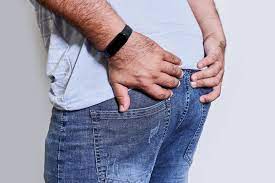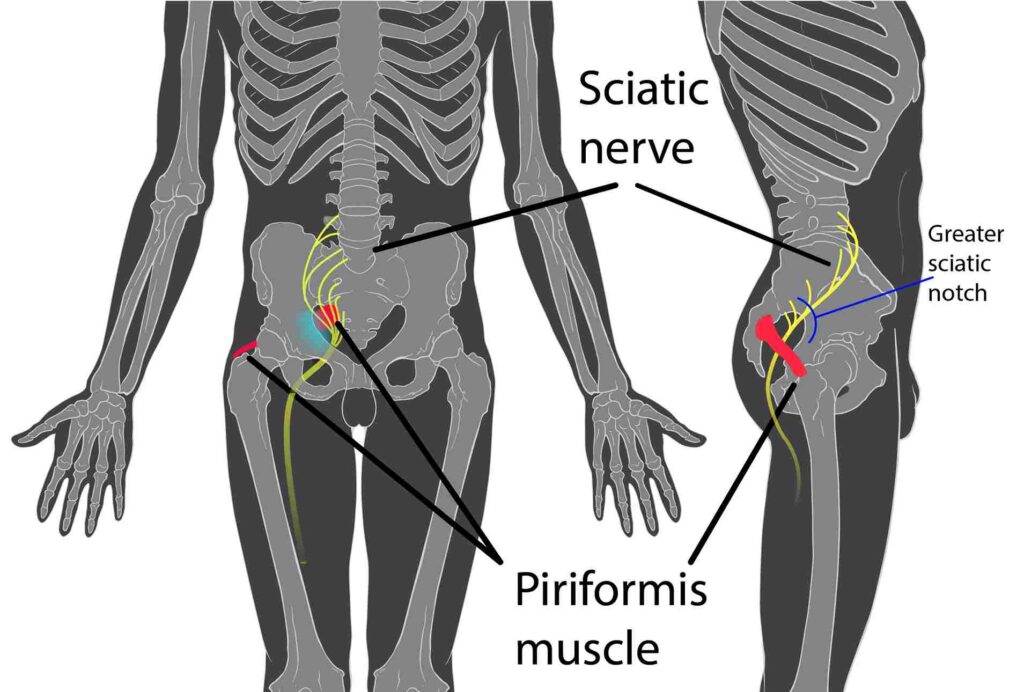Do you experience pain in your buttocks? If so, you’re not alone. Many people suffer from this type of discomfort, which can be caused by a variety of factors. In this blog post, we will discuss the most common causes of buttocks pain and what you can do to alleviate it. We’ll also provide some tips for preventing future pain from occurring. So if you’re currently dealing with buttock pain, read on for some helpful information!
Contents
What Is Buttocks Pain?

Buttocks pain is a common complaint that can have many potential causes. In some cases, the pain may be localized to one area while in other cases it may radiate out from the buttocks toward the lower back, hips, legs, and feet. Some of the most common causes are muscle strains or spasms, sciatica, herniated discs, and arthritis.
What Are the Symptoms of Buttocks Pain?
The symptoms of buttocks pain are as follows:
- Dull aching pain in the lower back or buttocks
- Pain that radiates down the legs and into the feet
- Difficulty sitting for more than a few minutes at a time
- Difficulty walking, running, or climbing stairs
What Causes Buttocks Pain?
There are various causes of buttocks pain. They are:
Muscle Strain
Muscle strain is often caused by overuse or repetitive use of muscles in the buttocks area. This could be due to activities such as running or strenuous exercise. It can also be caused by poor posture during sitting, standing, or sleeping.
Sciatica
Sciatica is a general term used to describe pain that travels down the sciatic nerve, which runs from the lower back through each leg. This type of pain can be caused by a herniated disc, spinal stenosis, or any other kind of compression on the nerve roots in the lower spine.
Piriformis Syndrome
The piriformis muscle runs from the hip to the base of the spine and is involved in controlling leg movement. Piriformis syndrome occurs when this muscle becomes inflamed or irritated, which can occur from activities such as running, climbing stairs, and sitting for long periods of time.
Inflammation of the Sacroiliac Joint
The sacroiliac joint is located in the lower part of the spine where it connects with the hip bones. Inflammation in this area is often due to repetitive movements or excessive force being placed on the joint.
Nerve Entrapment or Compression
Nerves in the lower back can become compressed due to inflammation, overuse, trauma, or age-related degeneration. This can lead to pain and numbness that radiates down into the buttocks area.
Arthritis
Certain types of arthritis can cause inflammation in the buttocks area. This could include osteoarthritis, rheumatoid arthritis, or ankylosing spondylitis.
How It Is Diagnosed?
When you experience pain in your buttocks, it is important to first find out what the source of the problem is. The most common causes are either an injury or overuse of the area. It is important that you visit a doctor to determine what is causing the pain so that appropriate treatment can be administered.
A physical exam may be conducted, in which the doctor will manually assess the area to determine if there is an injury or other issue. Imaging tests may also be recommended to identify any underlying health issues. X-rays and CT scans are some of the imaging techniques that can be used to examine musculoskeletal structures in the pelvic area. Your doctor may also recommend an MRI if nerve damage is suspected.
Once the cause of your pain has been pinpointed, your doctor will work with you to develop a treatment plan that best addresses your needs.
What Are The Treatment Options?

There are various treatment options for buttocks pain:
Physical Therapy
A physical therapist can help you relieve pain and improve mobility in your lower body with exercises to strengthen the muscles around your hips, such as squats or glute bridges.
Ice and Heat Therapy
Applying an ice pack to the affected area can reduce inflammation while heat therapy may help relax tight muscles.
Corticosteroid Injections
If other treatment options have failed, your doctor may recommend corticosteroid injections to reduce inflammation in the joint or muscle.
Massage therapy
Massage therapy can help to reduce tension in the muscles and connective tissues, increase blood circulation, and reduce pain.
Acupuncture
Acupuncture has been found to be effective in relieving pain associated with the buttocks pain. It may also help in reducing inflammation.
Exercises
Stretching exercises, yoga poses, or low-impact aerobics like swimming are a great ways to strengthen your back muscles and address any tightness that may be causing your buttocks pain. You should focus on exercises that target the lower back, hips, glutes, and hamstrings. You can also use ice or heat therapy to provide relief from pain and discomfort.
Medication
Over-the-counter (OTC) medications such as ibuprofen, acetaminophen, naproxen sodium, or aspirin are often used to reduce inflammation and provide temporary relief from buttocks pain.
Nonsteroidal anti-inflammatory drugs (NSAIDs) may be prescribed to reduce inflammation and provide pain relief.
You can also use topical creams, gels, or ointments for localized pain relief. If you need more long-term pain relief, your doctor may prescribe stronger medications such as muscle relaxants, anti-inflammatory drugs, and narcotics.
Surgery
If other treatments don’t bring relief, you may need to consider surgical options. In some cases, surgery can help release tension in your muscles or align the joints in your spine by correcting structural problems such as herniated discs, scoliosis, and spinal stenosis. Surgery is usually the last resort for treating buttocks pain, but it can be an effective way to reduce pain and restore mobility.
No matter which treatment option you choose, it is important to discuss your symptoms and treatment options with your doctor before beginning any form of therapy. Your doctor can assess the cause of your buttocks pain and recommend the best possible course of treatment.
By making lifestyle changes, such as avoiding activities that may be causing pain, maintaining a healthy weight, stretching regularly, and getting enough rest, you can help reduce your risk of developing buttocks pain. Additionally, if you experience chronic pain or discomfort in your buttocks, it’s important to speak with your doctor for a proper diagnosis and treatment plan. With the right care, you can manage your symptoms and reduce the risk of further damage. With the help of a healthcare team, you can find relief from pain and discomfort in your buttocks.
Conclusion
It may be concluded that buttocks pain can have a variety of causes, from injury or overuse to medical conditions like sciatica and piriformis syndrome. Fortunately, there are many treatments available for buttocks pain, ranging from topical creams and hot/cold therapy to physical therapy exercises and even surgery in some cases. If you are experiencing persistent or severe pain in your buttocks, it is best to consult with your healthcare provider for an accurate diagnosis and treatment plan. With the right care and attention, you can find relief from buttocks pain and get back to living a more active life.
Physical Therapy help patients recover from pain. If you’re experiencing Back pain, Shoulder pain, Knee pain, Neck pain, Elbow pain, Hip pain, or Arthritis pain, a physical therapist at MantraCare can help: Book a physiotherapy session.


